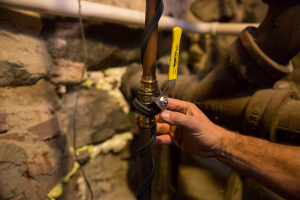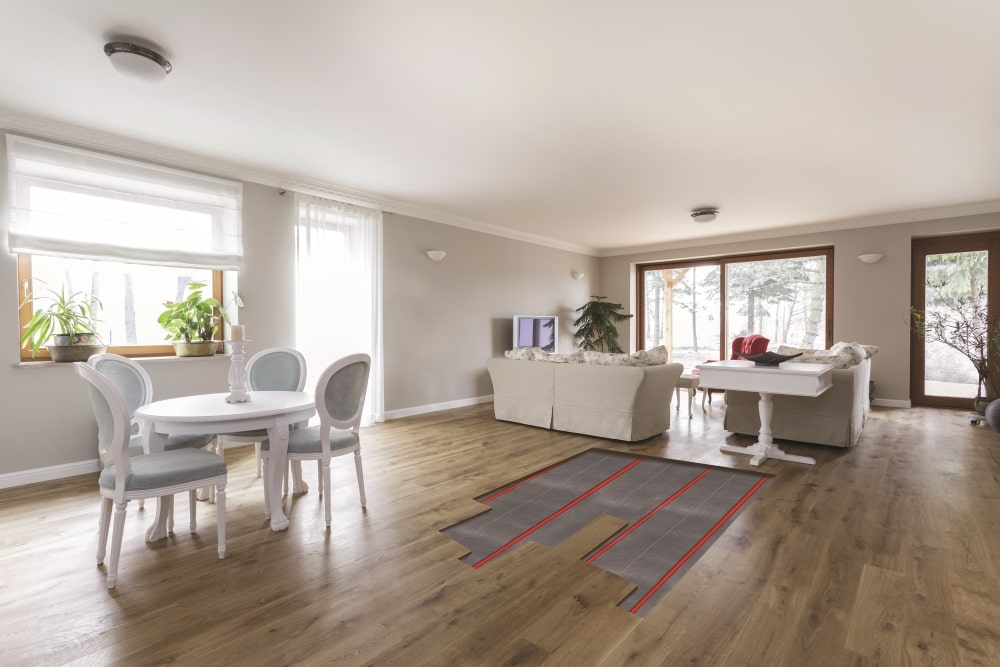Radiators have been around since the mid-1800s. While newer heating options are now available, they remain widely used, especially in older homes. Their lasting popularity comes from their modular design, which is relatively inexpensive to repair, as individual parts can often be replaced. However, this doesn’t entirely eliminate the need for full radiator replacements, making it essential to understand the cost of radiator replacement.
So, how much does it cost to replace a radiator? What factors affect radiator replacement costs? Let’s break it down.
What is a Radiator? How Do Radiators Work?
Radiators are a common component of some central heating systems, providing heat in rooms through either hot water or steam. These systems rely on a boiler to heat the water or generate steam, which then flows to the radiators, warming the air around them and spreading heat throughout the room.
Electric radiators are another option, but they tend to be more expensive to operate compared to their hot water or steam counterparts.
How Much Does it Cost to Replace a Radiator?
Are radiators expensive? They can be.
Radiators can vary significantly in price depending on type, size, material, and installation requirements. The average cost of radiator replacement ranges from $1,000 to $3,500, with lower-end estimates starting at $500 and high-end installations reaching $8,600.
Check the Boiler First
Before replacing a radiator, it’s important to evaluate your boiler. In most cases, radiators can be replaced independently, but if your boiler is old, inefficient, or damaged, replacement may be necessary. Boilers are the most expensive component of a central heating system, with costs ranging from $1,500 to $15,000, averaging around $7,500 depending on the type and efficiency.
4 Factors That Affect the Cost of Radiator Replacement
The radiator replacement cost can vary drastically, especially depending on various factors. So, what factors affect how much a radiator will cost? Here is a breakdown:
1. Heat Source
The radiator’s heat source significantly impacts the cost; it can mean the difference between paying a couple hundred dollars to a thousand or more.
Electric Radiators
While expensive to run, electric radiators are moderate in price when replacing them, with costs ranging from $200 to $1,500. The installation process is straightforward; however, you will need an electrician to install it properly.
Hot Water Radiators
Hot water radiators are more affordable of the three options, with costs ranging from $100 to $1,000 for new units. You can decrease labor costs by finding a replacement radiator similar to your current one. Otherwise, the installer will require more time to connect the pipes, which raises your radiator installation cost.
Steam Radiators
When you ask, “Are radiators expensive?” It may be because you’ve heard of steam radiators, which are a more expensive option, ranging from $300 to $2,500. Like hot water radiators, they can have one or two pipe systems, which also affect the cost. You’ll pay more for the latter option for installation, but it will also be more efficient and durable.
2. Size
Hot water and steam radiators are measured in British Thermal Units (BTUs) while electric radiators are measured in watts. These measurements determine the unit’s heating capacity, which is a key factor in answering the question, “How much does it cost to replace a radiator?
- Smaller units that offer 3,000 BTUs range in price from $200 to $500, and prices steadily rise, with 12,000 BTUs radiators costing from $600 to $1,200.
- For electrical units, a small 400 Watts system can cost between $100 to $400, while larger 1,000 Watts radiators can cost between $900 and $1,000.
3. Types and Styles
There are a variety of radiator types and styles. Some refer to types as how they are installed, like baseboard radiators, which are installed along the baseboards. Others can refer to the style, whether flat or a column.
Regardless of your choice, they come in different sizes, finishes, and materials. These styles and types of radiators are another of the many factors that can impact costs.
Here’s a breakdown of common radiator options and their price ranges:
- Baseboard Radiators: $35 to $1,000
- Vertical Radiators: $300 to $1,200 (plumbed); $300 to $2,000 (electric)
- Horizontal Radiators: $100 to $1,000 (plumbed); $300 to $1,200 (electric)
4. Material
Steel is the most common radiator material, though you can also find older models made of cast iron. The average radiator replacement cost for plumbed cast iron units is between $200 and $700, while electric systems cost $400 to $1,000.
Stainless steel plumbed systems go for $200 to $1,000, while electric systems go for $200 to $1,200.
How Much Does Labor Cost on a New Radiator?
Labor costs can vary depending on the company, whether it is a plumbed system or electric, where you live, the location of the unit, and more. Generally, plumbed radiator units will cost about $200 an hour, with installation taking roughly 3 to 4 hours to complete.
Installation labor for electric units costs somewhat less, with rates generally around $100 to $150 an hour and about 2 to 3 hours worth of labor necessary.
An Alternative in Underfloor Radiant Heating
While radiators are a reliable option, they have limitations, including inefficiency in large spaces and reliance on costly boiler replacements. Electric underfloor radiant heating is an effective alternative that heats rooms from the floor up, providing cleaner and more energy-efficient warmth. By switching to underfloor heating, homeowners can save up to 25% on energy bills.
How Does Radiant Heat Compare to the Average Radiator Installation Cost?
The cost of underfloor heating depends on several factors, including the type of system (electric or water-based) and the size of the heated area.
- Cable Systems: Prices can vary based on if cables or mats will be used. For a kitchen with 150 sqft of heated area, the cable will cost $790 and the membrane to fix the cable into will cost $633 for a combined $1,423 for the system.
- Mat Systems: Using Warmup’s StickyMat system for the same 150 sqft heated kitchen will cost about $1,539.
- Thermostats: Smart thermostats enhance the efficiency of any underfloor radiant heating system and cost between $252 and $298.
Installation labor averages $10 to $15 per square foot, with electricians charging $50 to $150/hour.
Want to know how much radiant floor heating costs in your home? Get a quote from Warmup today!
Efficient Heating with Radiant Floor Systems from Warmup
Radiators have served homes for centuries and remain a viable heating solution. However, electric underfloor radiant heating offers a more modern, energy-efficient alternative. Whether you replace your radiator or invest in underfloor heating, Warmup’s systems provide clean, reliable warmth for any space.
Contact us to learn more and start your heating upgrade today!




![Thumbnail [200x250]](/wp-content/uploads/Indoor-Systems-Page-Image.png)
![Thumbnail [200x250]](/wp-content/uploads/image-13.png)
![Thumbnail [200x250]](/wp-content/uploads/Projects-Image.png)